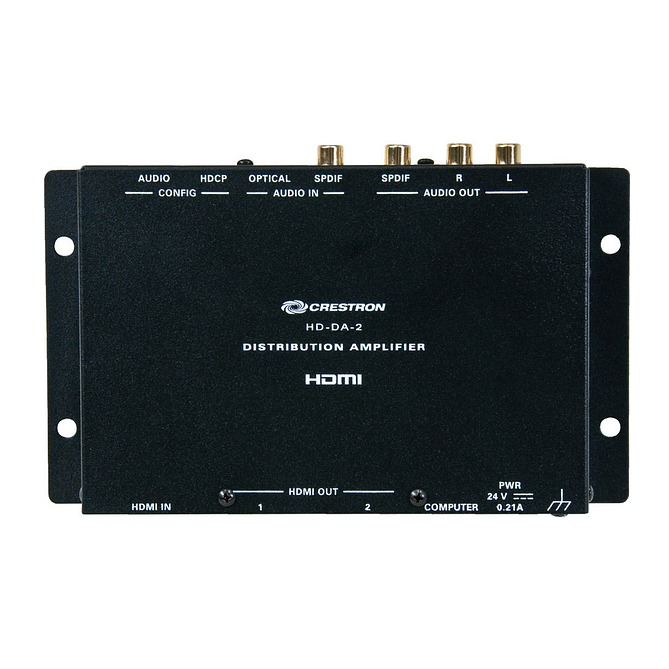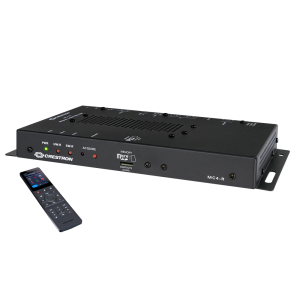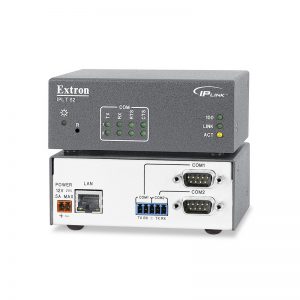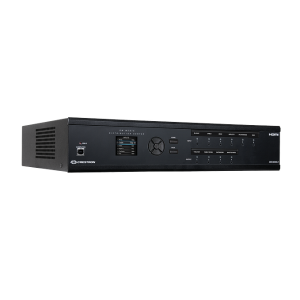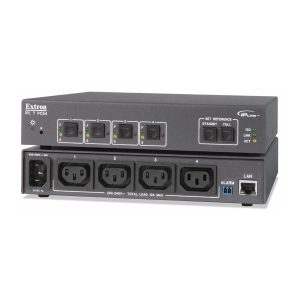Description
Model
An advanced HDMI® splitter with capabilities for audio embedding and de-embedding, and management of EDID and HDCP keys.
HDMI Signal Splitter
As an HDMI distribution amp, the model lets you easily share one HDMI signal between two display devices or split that signal to feed one display and a separate audio processor. Ideal for use with Blu-ray Disc® and multimedia computer sources, the HD-DA-2 supports high-definition video up to 1080p60 with Deep Color and 3D, as well as high-resolution computer signals up to 1920×1200. It also handles high-bitrate 7.1 surround sound audio formats like Dolby® TrueHD, Dolby Atmos®, and DTS-HD®.
HDMI Audio De-embedder
In addition to its two HDMI outputs, the model also includes a SPDIF coaxial digital audio output and a stereo analog audio output, allowing the audio signal to be extracted from the HDMI source and converted to feed a legacy audio device. The SPDIF output supports Dolby Digital® or DTS® 5.1 surround sound signals, while the analog output handles stereo 2-channel signals.
HDMI Audio Embedder
The HD-DA-2 also provides SPDIF coaxial and optical digital audio inputs, either of which may be selected as the audio source in place of the incoming HDMI audio signal. This allows any HDMI video signal to be merged with an alternate audio source, effectively letting you generate a new HDMI AV signal containing your choice of audio and video sources. The HDMI input can even accept the signal from a DVI digital video source, allowing separate DVI and SPDIF signals to be merged into one HDMI signal, perfect for integrating an older digital AV source or computer into a modern HDMI-based system.
1-to-4 Audio Distribution
All of the outputs on the HD-DA-2 can be used simultaneously to feed up to four separate devices. The surround sound format for all outputs is simply limited to the best common format supported by the selected input and outputs. For instance, if you are using the analog output, which only supports stereo 2-channel signals, then the HDMI and SPDIF outputs will be limited to 2-channel PCM. If you’d like to distribute 5.1 surround sound via the SPDIF output, then the HDMI outputs will be limited to 5.1 as well and the analog output will be disabled entirely. Eight-channel PCM and high-bitrate 7.1 formats can only be handled by HDMI, so naturally, all the other inputs and outputs on the HD-DA-2 must be disabled to pass the highest quality formats.
Reliable Performance with Simple Setup
Configuring the HD-DA-2 for each application requires just a quick setting of its DIP switches. The switches provide a simple yet versatile means for selecting the audio input source, configuring EDID, and choosing which audio formats to allow.
Embedded in every HDMI signal, EDID allows a display or audio processor to inform the upstream source about its format and resolution capabilities, enabling the source to configure itself to deliver an optimum signal to the downstream device. The model provides extra measures to ensure optimum results when distributing HDMI to multiple destinations, letting the installer select which downstream device provides the EDID, or letting the HD-DA-2 determine the best common resolution and format that both devices can support. It also allows the audio EDID to be controlled independently of the video, even letting the installer manually limit the audio format based on the inputs and outputs in use.
Reliability is further enhanced by allowing the installer to limit the number of HDCP keys to match the capabilities of the source, ensuring the core system remains functional in the event too many devices get connected.

